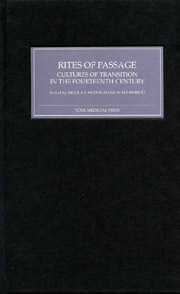Book contents
- Frontmatter
- Contents
- List of Contributors
- Preface
- Introduction: Rites of Passage
- Re-writing a Rite of Passage: The Peculiar Funeral of Edward II
- Coming to Kingship: Boy Kings and the Passage to Power in Fourteenth-Century England
- Boy/Man into Clerk/Priest: The Making of the Late Medieval Clergy
- Manners Maketh Man: Living, Dining and Becoming a Man in the Later Middle Ages
- Rites of Passage in French and English Romances
- Becoming Woman in Chaucer: ‘On ne naît pas femme, on le meurt’
- John Gower's Fear of Flying: Transitional Masculinities in the Confessio Amantis
- ‘Le moment de conclure’: Initiation as Retrospection in Froissart's Dits amoureux
- Index
- YORK MEDIEVAL PRESS: PUBLICATIONS
Manners Maketh Man: Living, Dining and Becoming a Man in the Later Middle Ages
Published online by Cambridge University Press: 12 September 2012
- Frontmatter
- Contents
- List of Contributors
- Preface
- Introduction: Rites of Passage
- Re-writing a Rite of Passage: The Peculiar Funeral of Edward II
- Coming to Kingship: Boy Kings and the Passage to Power in Fourteenth-Century England
- Boy/Man into Clerk/Priest: The Making of the Late Medieval Clergy
- Manners Maketh Man: Living, Dining and Becoming a Man in the Later Middle Ages
- Rites of Passage in French and English Romances
- Becoming Woman in Chaucer: ‘On ne naît pas femme, on le meurt’
- John Gower's Fear of Flying: Transitional Masculinities in the Confessio Amantis
- ‘Le moment de conclure’: Initiation as Retrospection in Froissart's Dits amoureux
- Index
- YORK MEDIEVAL PRESS: PUBLICATIONS
Summary
Man must consume food in order to live. About this simple fact even most academics would not choose to argue. One might even care to suggest that if food carries any absolute value it is its nutritional value. In fact, however, even this can be seen as a culturally-constructed value. Take the example of sugar. In the Middle Ages, cane sugar was imported into England in vast quantities from its place of production, the ‘leyes and pondes faste by þe ryuer Nilus’. As an imported good, sugar carried with it the exoticism of its foreign place of production. It was an expensive item associated with the luxury of the court. It was valued, however, not only for its ability to render foods more palatable through its sweetness, but also as a powerful medicine. John Trevisa attributed sugar with the ability to
druye and to clense, and to dissolue and tempre, and to make þynne and cliere, and to moist þe wombe wiþouten eny fretyng or gnawynge, and to clense þe stomak, and to plane and smeþy rowЗnesse of þe breste and of þe longen, and to clere þe voys and to don away hosnesse and cowhe, and to restore humour and moisture þat is yspend and ywasted[…]
He concluded that it was ‘þerfore most profitable in medicynes and in electuaries, in poudres and suripes’.
- Type
- Chapter
- Information
- Rites of PassageCultures of Transition in the Fourteenth Century, pp. 67 - 82Publisher: Boydell & BrewerPrint publication year: 2004



